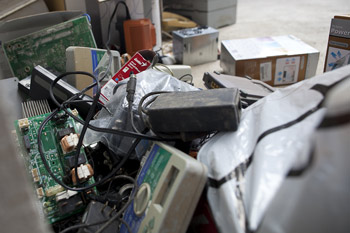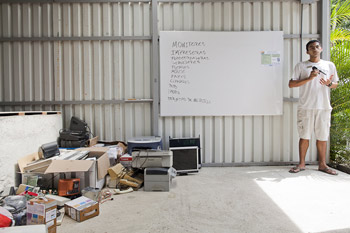Local businesses and residents dropped off over 100 items at the electronic waste collection on Saturday 14 and Sunday 15. The activity was sponsored by Hotel L’Acqua Viva, Sustainable Nosara and the Nosara Chamber of Tourism.
By the end of the weekend, Randall Cortes, the hotel’s manager and coordinator of the project, had piled nine computer towers, 20 power sources, 12 printers, over 30 keyboards, six monitors, two DVD players, a hard disc drive, projector, fax machine and assorted circuit boards and computer mice into the hotel’s training room. All of these items were transported to the electronic waste collector in Carrillo named “Bodequita” of the Costa Rican Company Grupo Trisan.
The 18 donors who participated included private residents and diverse businesses. Matt Hazelton of Hotel and Restaurant Gilded Iguana, who contributed a rusty looking five-year-old fax machine, an out-of-date printer and used keyboards said that he brought in the “old junk” from his bodega.
“I read that it is not good for the environment to take computers and things to the dump so I’ve been holding these and waiting for an electronics waste collection opportunity”. Hazelton said he would definitely bring electronics in again if the community holds another collection in the future. |
|
 |
| |
|
| |
 |
Electronic products are indeed filled with many metals and alloys, which cannot be recycled in a regular dump. Grupo Trisan, an ISO 14000 internationally certified collector of unused electronic devices, collects, sorts, evaluates and packages discarded electronics and then exports them to European or Asian recycling centers.
John Varela, Director of Business Development for Pacific Corporate Solutions, a US based electronic waste collector which just finished collecting 10 million pounds of e-waste from bankrupt California solar company Solyndra, described to VON what “processing” means in the electronic waste industry.
The major recyclers have huge automated facilities with conveyer belts that sort the electronic products. The items are then disassembled to separate out the glass, plastic, alloys and metals. Each component is pulverized and packaged into a new batch before being resold on the secondary commodities market. For example, CPU’s contain aluminum, gold, silver and mercury, along with the plastic encasing the device. The materials are recycled and sold again to make new computers and circuit boards or for other uses, Varela said.
Cortes said it took him a long time to find a certified company that accepts electronic garbage and noted that he just found one in Escazu that takes discarded ink cartridges. “We will be able to add ink cartridges to the list of what we accept next time,” he said.
Cortes was pleased with the number of items brought in for the first event and the overall community participation. Hayleen Aguirre, manager of Nosara’s Banco de Costa Rica said the bank is supporting the project by contributing to transport the materials. “We see this as a form of supporting the development of the community. This type of recycling is very specialized and it is not easy to get rid of these kinds of items.”
According to Cortes the next electronic waste collection should be done in high season “when the peak of people are here in their houses, like maybe in February. I have heard that there are others who have old computers in their homes here but couldn’t come this time.”
As each donor dropped off their dusty boxes of discarded monitors and broken keyboards, Cortes offered them an Hojas de Sen bush to plant on their property in exchange. “We have a responsibility, as part of the community, to give back,” he said. “This is our home and we have to take care of it.”
| 
